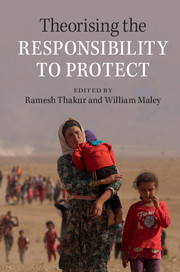Book contents
- Frontmatter
- Contents
- List of figures
- Notes on contributors
- Part I Context
- Part II The Responsibility to Protect, normative theory and global governance
- 5 The Responsibility to Protect and world order
- 6 International law and the Responsibility to Protect
- 7 The Responsibility to Protect, multilateralism and international legitimacy
- 8 Global governance and the Responsibility to Protect
- 9 International law, the Responsibility to Protect and international crises
- 10 The Responsibility to Protect and the just war tradition
- 11 War is not the answer: the Responsibility to Protect and military intervention
- Part III The Responsibility to Protect and international social purposes
- Index
10 - The Responsibility to Protect and the just war tradition
from Part II - The Responsibility to Protect, normative theory and global governance
Published online by Cambridge University Press: 05 August 2015
- Frontmatter
- Contents
- List of figures
- Notes on contributors
- Part I Context
- Part II The Responsibility to Protect, normative theory and global governance
- 5 The Responsibility to Protect and world order
- 6 International law and the Responsibility to Protect
- 7 The Responsibility to Protect, multilateralism and international legitimacy
- 8 Global governance and the Responsibility to Protect
- 9 International law, the Responsibility to Protect and international crises
- 10 The Responsibility to Protect and the just war tradition
- 11 War is not the answer: the Responsibility to Protect and military intervention
- Part III The Responsibility to Protect and international social purposes
- Index
Summary
The literature on the Responsibility to Protect (R2P) is suffused with references to the principle's connection to the just war tradition. Some commentators argue that R2P arose out of just war thinking, and in particular the tradition's focus on the use of force to end tyranny and promote justice. Another, more critical line of argument has suggested that R2P tries to ‘distinguish between grubby, ordinary wars and just wars intended to stop mass atrocities’ – a distinction its critics say it fails to achieve. This chapter examines the relationship between R2P and the just war tradition. It focuses in particular on moral judgments about decisions to use force to protect populations from genocide and mass atrocities and the question of whether the authority to take such decisions should rest with the UN Security Council or individual states.
The first part of the chapter examines the question of decision-making criteria for the use of force. After briefly charting some of the debates about the relative merits of different criteria, I focus on the meaning and scope of just war principles relating to decisions to use force (jus ad bellum) and the question of how these principles can be used as a form of practical moral reasoning. The principles espoused by the just war tradition and adopted in part by the International Commission on Intervention and State Sovereignty (ICISS) should not be seen as conditions that can be ‘ticked off’ to establish the moral credentials of an armed intervention, but rather as a holistic framework that can guide moral reasoning and debate. The second part turns to the question of authority. International law insists that only the UN Security Council is permitted to authorise the use of force against the will of host states but some contemporary just war theorists argue that individual states retain a right to use force unilaterally for such purposes. In contrast, I argue that the UN Charter provides a robust (albeit imperfect) institutional setting that facilitates moral debate about the use of force for human protection purposes. Without the checks and balances provided by the Charter system, just war principles and the decision-making criteria proposed by ICISS could become mere modes of self-justification for interventionist states.
- Type
- Chapter
- Information
- Theorising the Responsibility to Protect , pp. 181 - 199Publisher: Cambridge University PressPrint publication year: 2015



